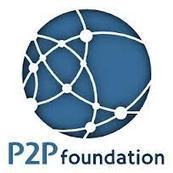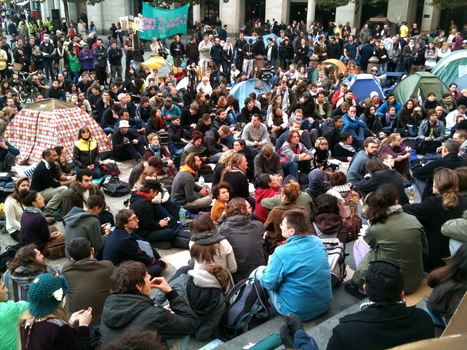 Your new post is loading...
Michel Bauwens (Madison, Wisconsin), June 12, 2016: Part One – Analyzing the global situation One of the best books I have read in the last ten years is undoubtedly, The Structure of World History, by Kojin Karatini.
Marshall Ganz is a ‘social movement scholar’ and author of the book, Why David Sometimes Wins.He shares his general thoughts on the use of social media in the Arab spring.
You do not escape the world of big corporates and big government by wishing for a trustless set of technologies that collectively resemble a technocratic crypto-sovereign. Rather, you use technology as a tool within ongoing political battles, and you maintain an ongoing critical outlook towards it. The concept of the decentralised blockchain is powerful. The cold, distrustful edge of cypherpunk, though, is only empowering when it is firmly in the service of creative warm-blooded human communities situated in the physical world of dirt and grime. Perhaps this means de-emphasising the focus on how blockchains can be used to store digital assets or property, and focusing rather on those without assets.
“The old icebergs of state and corporation are dissolving into a fluid sea where action only becomes meaningful in concert with others. The waves of change demand interconnections, because we know all of us together are smarter than any one of us on our own.
Of about 30 detailed indicators I developed for tracing these historical cycles (reflecting popular well-being, inequality, social cooperation and its inverse, polarization and conflict), almost all have been moving in the wrong direction in the last three decades.
“All isn’t lost for distributed power, though. For institutional power the Internet is a change in degree, but for distributed power it’s a change of kind. The Internet gives decentralized groups – for the first time – access to coordination. This can be incredibly empowering, as we saw in the SOPA/PIPA debate, Gezi, and Brazil. It can invert power dynamics, even in the presence of surveillance censorship and use control.
“Regardless, the biggest difference between the new Net parties and the old is something else: their open program. Both the Pirate Party and Partido de Internet have very specific objectives regarding Internet freedom, free licenses and participatory democracy. And Equo doesn’t try to hide its green face. The Candidatura d´Unitat Popular (CUP) – a Net-born Catalonian Party – defines itself as “Anticapitalist, Separatist Left”. Despite this, Net parties are, above all, open processes. They are also, by choice, unfinished mechanisms. The aim is to create platforms, protocols and tools that can employed by others. Anyone can use the mechanism, regardless of the content created with it.”
|
It's indeed a remarkable synthesis of where the P2P movement is at, and how it is both grappling with the tensions in the world and within the movements.
By focusing on hierarchy instead of class, Bookchin became the first Leftist thinker to offer a coherent, meaningful framework for the liberation struggles in the Middle East. His narrative implies that a revolutionary movement in Kurdistan is a struggle at the material origin of institutional hierarchy itself. Although such a localized struggle cannot automatically release hierarchy’s tight grip over rest of the world, it does powerfully illustrate the full scope of the revolutionary task at hand. In this way, the Kurdish freedom movement is not only influenced by social ecology, it also enriches that perspective and articulates it further. The human beings who live at the material origins of institutional hierarchy, and who have maintained organic ways of life there for millennia, are now answering the call to establish the positive conditions of a free society.
The emerging global alliance and cooperation between civil, social, and political actors – that is collectively referred to as ‘global civil society’ – is first and foremost a crucial vehicle for transnational civil solidarity, which translates into the consolidation of the hold of civil societies transnationally.In a very limited sense, it is true that this coming on to the world stage of non-state actors contributes to the democratisation of world politics, a stage that has so far been monopolised by nation-states. But seen through the lens of the historic larger and wider democratisation that is beginning to unfold in our times, this cooperation and consolidation is, more importantly – due to the dynamics of civility and its internal tendencies to corporatisation that I have tried to discuss in this essay –, an instrument for the consolidation, strengthening, and imposition of historically unequal social and political relations and entrenched interests at local, national, regional, and global levels. In fundamental terms, what is fondly called ‘global civil society’ is therefore today arguably contributing to less democracy, not more.
Recent waves of revolutionary struggle – the Occupy movement in New York and elsewhere, London on the steps of St. Pauls, Cairo at the time of Mubarak’s fall, Greece and Spain in response to neoliberalism-imposed austerity, Gezi Park in Istanbul…the list is endless – throw into relief a common issue. The issue is that ofrecognition. Occupy-style events and initiatives point towards a future where mutual recognition serves as a guiding thread in human interaction. The present short paper explains the sense in which this is the case.
“As Falvinge explains, decentralized does not mean leaderless. The leader of or a swarm leads by inspiration and example, setting the vision and goals for the organization while building a culture that empowers members of the swarm to act. Falvinge contrasts this approach with the leaderless structure of the Occupy movement, which he says sacrificed direction and cohesion in favor of the resilience gained by lacking a leader who can be targeted by opposition.
“The emergence of Partido X (Spain), Partido de la Red (Argentina), Red Sustentável (Brasil) and Wikipartido (Mexico) suggest a new era in politics. Net (InterNet) parties incorporate the open, horizontal and leaderless processes associated with free software and social movements such as 15M.
“We may not need capital-L Leaders, but we certainly need small-l leaders by the tens of thousands. You could say that, instead of a leaderless movement, we need a leader-full one. We see such leaders regularly at 350.org. When I wrote earlier that we “staged” 5,200 rallies around the globe, I wasn’t completely accurate. It was more like throwing a potluck dinner. We set the date and the theme, but everywhere other people figured out what dishes to bring.
|
 Your new post is loading...
Your new post is loading...














